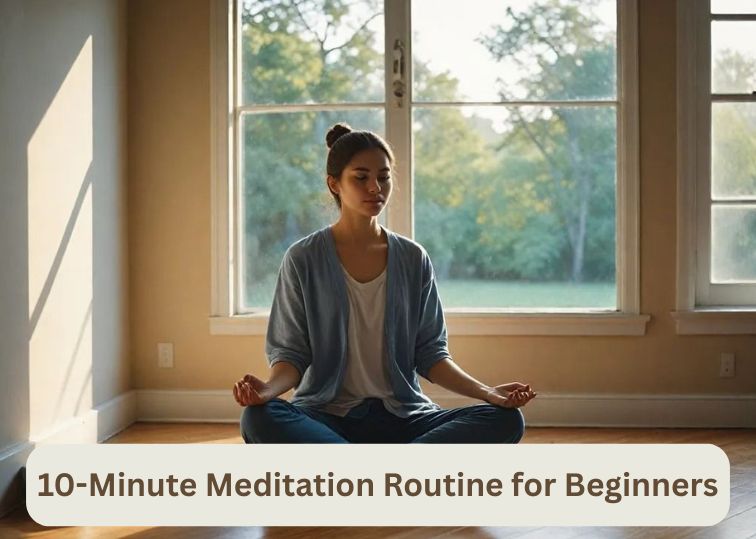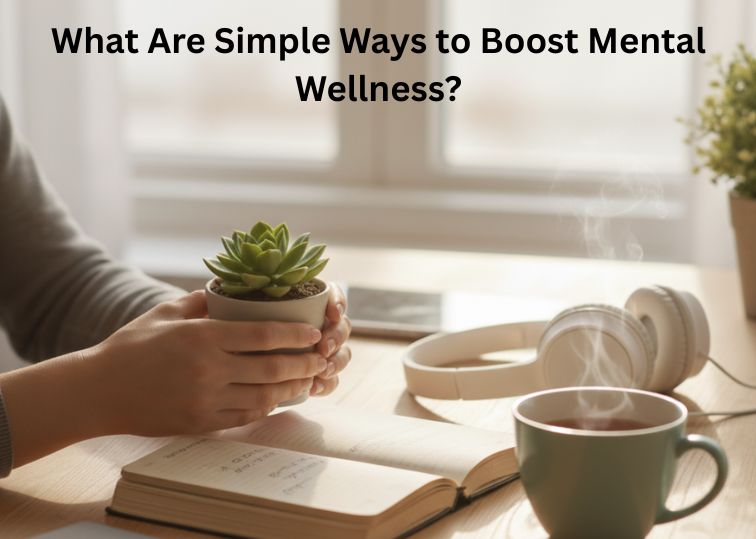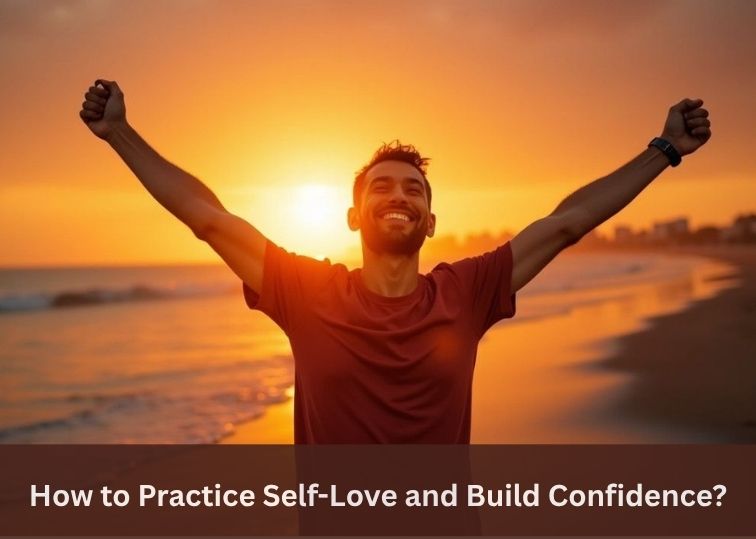Life today moves very fast. We wake up, check our phones, rush to work, handle tasks, and go to bed tired. In this busy routine, our mind rarely gets a chance to rest. This is where meditation can help. Meditation is not about stopping your thoughts or sitting in silence for hours. It is about learning how to calm your mind and find peace in small moments.
If you’re new to it, don’t worry. You don’t need to be perfect or spiritual to begin. Even ten minutes a day can make a big difference. This simple Meditation Routine for Beginners will help you start slowly and gently, even if you’ve never meditated before.
What Is Meditation?
Meditation is simply a way to focus your mind. It helps you stay in the present moment instead of worrying about the past or future. You sit quietly, breathe slowly, and let your thoughts come and go without reacting to them.
It’s like giving your mind a short break every day. You don’t need special tools, a yoga mat, or incense. You just need a few minutes and a peaceful corner.
Why Meditation Matters
Many people think meditation is hard, but it’s actually very natural. When you meditate, your body relaxes, your heartbeat slows down, and your mind becomes clear. You feel lighter, calmer, and more in control of your emotions.
It helps reduce stress, anxiety, and negative thoughts. It improves focus and sleep. Over time, it makes you more patient and peaceful. That’s why starting a Meditation Routine for Beginners is one of the best habits you can build for your mind and body.
Getting Ready to Meditate
Before you start, find a quiet place where you won’t be disturbed. It can be your bedroom, balcony, or even a small corner of your home. Sit comfortably on the floor, a chair, or your bed. Keep your back straight but relaxed.
You can close your eyes or keep them slightly open, whatever feels right. Make sure your phone is on silent mode so you can focus completely on yourself.
Now you’re ready to begin your simple 10-minute Meditation Routine for Beginners.
Step-by-Step 10-Minute Meditation Routine for Beginners
Minute 1: Sit Still and Set an Intention
Start by taking a deep breath. Breathe in through your nose, and slowly exhale through your mouth. Tell yourself you’re taking these 10 minutes just to relax and feel better. Setting this small intention helps your mind prepare for calmness.
Minute 2: Focus on Your Breathing
Pay attention to your breath. Feel the air entering your nose, filling your lungs, and leaving your body. Try not to control it, just notice it. Breathing helps you stay in the present moment.
Minute 3–4: Observe Your Thoughts
Your mind will start to wander. You might think about your to-do list or something that happened earlier. That’s normal. Don’t fight your thoughts. Just watch them come and go, like clouds passing in the sky.
Whenever you get lost in thought, gently return to your breath.
Minute 5–6: Notice Your Body
Now, bring your attention to your body. Notice how your shoulders, hands, and legs feel. Are they tight or relaxed? If you feel any tension, breathe into that area and let it go. This helps you release physical stress too.
Minute 7–8: Feel the Present Moment
Focus on how you feel right now. Maybe you hear birds outside, or the sound of your own breath. Be fully here, in this moment. Forget everything else for a while. This is the heart of meditation, being present.
Minute 9: Be Grateful
Think of something you’re thankful for. It could be your health, your family, or even this quiet time for yourself. Gratitude fills your heart with peace and positivity.
Minute 10: Slowly Open Your Eyes
Take one last deep breath. Slowly open your eyes. Feel how calm and refreshed your mind is. You’ve just completed a Meditation Routine for Beginners in 10 minutes!
Tips to Make Meditation Easier
- Be patient. Don’t expect your mind to be quiet immediately. It takes time.
- Meditate at the same time every day. Morning or before bed works best.
- Use soft music or guided meditation. It helps beginners stay focused.
- Start small. Even 5 minutes is enough in the beginning.
- Don’t judge yourself. Some days will feel easier than others. That’s okay.
The key is consistency, not perfection.
Benefits of a 10-Minute Meditation Routine
A daily meditation routine, even for 10 minutes, can bring many positive changes:
- It reduces stress and anxiety.
- Improves focus and concentration.
- Helps you sleep better.
- Makes you calmer and more positive.
- Increases emotional balance.
You’ll start noticing changes slowly. Maybe you’ll react less to small problems or feel lighter during the day. That’s how meditation begins to work, quietly, but powerfully.
Common Mistakes Beginners Make
Many people quit too soon because they think meditation is not working. But meditation is not about having a silent mind. It’s about learning to be at peace even when your thoughts are noisy. Don’t worry if you can’t focus perfectly. Just keep showing up every day. The more you practice, the easier it becomes. That’s why this Meditation Routine for Beginners is simple, so you can actually enjoy it.
Creating a Peaceful Space
You can make your meditation spot cozy and inviting. Light a candle, keep a small plant, or play soft sounds like ocean waves. A peaceful environment helps your mind settle faster. Some people also keep a journal nearby to note how they feel after meditation. It’s a great way to track your progress and stay motivated.
How to Stay Consistent
The hardest part is sticking with it daily. Set a reminder or link it with another routine, like after brushing your teeth or before bed. Tell yourself it’s just 10 minutes. Once you make it a habit, it becomes your favorite part of the day. Meditation will start to feel like a quiet friend who helps you breathe, relax, and think clearly.
Final Thoughts
Meditation is not about perfection. It’s about presence. You don’t need to empty your mind—you just need to notice your thoughts without reacting. This Meditation Routine for Beginners takes only 10 minutes, but it can transform your entire day. It helps you connect with yourself, find calmness, and handle stress better. So take a deep breath, sit quietly, and begin. Your mind deserves this peaceful pause.



